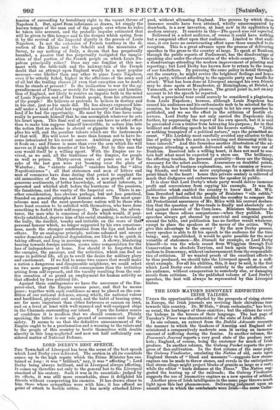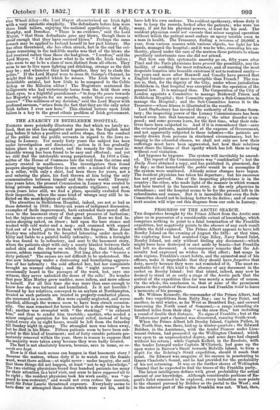THE LORD MAYOR'S. DISCOVERY. RESPECTING IRISH TAILORS.
trarnEn the opportunities afforded by the prospects of rising storms in Europe the Irish journals are reviving their chivalrous tone towards this country. Dr. M'Hale,. " drum ecclesiastic," has been, as usual, the harbinger of these enmities; 'bid the editors far excel the bishops in the terrors of their language. The last page of Tuesday's Times was characteristic of the state of Irish affairs. . In one column, an extract from the Dublin Advocate recounts the manner in which the Quakers of Amerieli and England ad- ministered a comparatively moderate sum it saving an immense amount of suffering during the famine: In another' Column, the Freeman's Journal reports a very good state of the produce mar- kets; England, of course, being- the • customer • for intich of Irish produce. In another column, the Galway Packet-reports the pro- gress of flax-cultivation. ,In. the first column of the same page, the Galway Vindicator, emulating the Nation of old, casts upon England threats of "blood and massacre "—suggests how steam- engines can be made to throw atones, and revels in the anticipation that steam-slings might project blocks of granite as large as a cart; while the editor "hurls defiance at the Times." The Nation sug- gested the tearing up of the railroads; the Galway Vindicator suggests the use of locomotive engines as a new species of arblast
-Another piece of Irish intelligence in the same page throws much
light Upon this last phtenomenon. Delivering in ent upon an assault ease in -which the combatants were Irish— se scene Cathe- rine Wheel Alley—the Lord Mayor characterized an Irish fight with a very sarcastic simplicity. The defendants before him were three Irish tailors, enjoying the national !Lppellatives of Kelly, Murphy, and Donohoe. g There is no evidence," said the Lord Mayor, "that these defendants gave any blows, though there is proof enough that they have received blows." Perhaps the same remark may be applied to Ireland herself in her past history. She has often threatened, she has often struck, but in the end the evi- dence remaining in the indelible marks was that of the blows she had received rather than those she had given. "I confess," said the Lord Mayor, "I do not know what to do with the Irish tailors ; who seem to me to be a class of men distinct from all others. They seem to me to live upon fighting and drinking, strange as the diet may be ; and wherever they herd together, they try to elude the police." If the Lord Mayor were to cross St. George's Channel, he might find the parallel which he misses. The Irish tailor is a formidable animal, but how little to be compared to the Celtic bishop or the Milesian editor ! The Magistrate sentenced the belligerents who had victoriously borne from the field their own black eyes, to a frightful punishment—" to keep the peace towards her Majesty's subjects for six months, under their own recogni- zances." "The mildness of my decision," said the Lord Mayor with profound sarcasm, "arises from the fact that they are the only sober Irish tailors I ever saw here." This clinical lecture upon Irish tailors is a key to the great ethnic problem of Irish government.



























 Previous page
Previous page